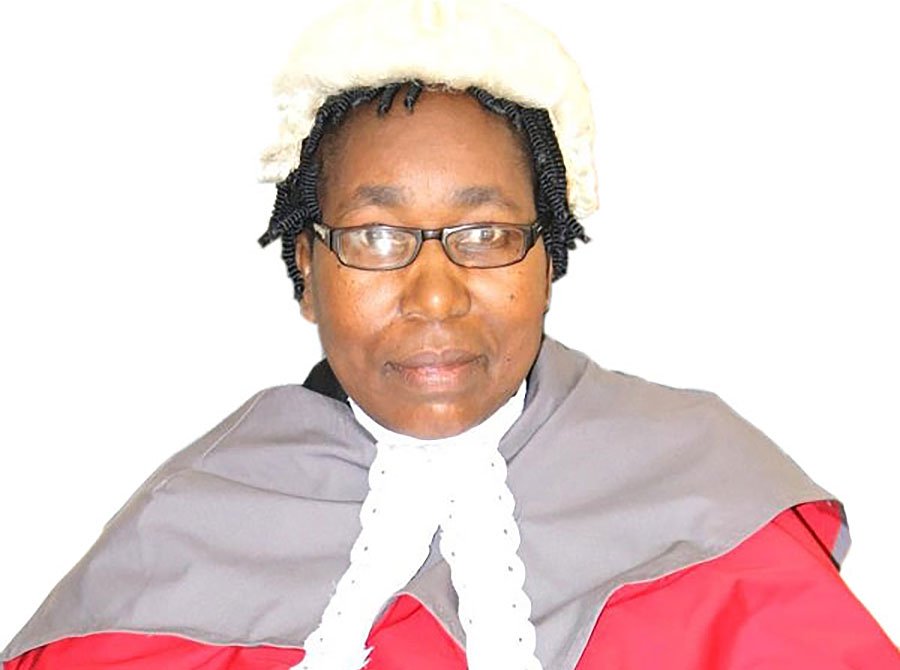Malaba violated investigative procedures to fire Erica Ndewere, ConCourt hears

Justice Erica Ndewere
The full bench of the Zimbabwe Constitutional Court met on Wednesday 15 May 2024 to hear an application by former High Court Judge Justice Erica Ndewere against President Emmerson Dambudzo Mnangagwa in which the former Judge claims that the President dismissed her unlawfully following an unlawful process.
Chief Justice Luke Malaba and Deputy Chief Justice did not preside over the hearing which was chaired by Justice Paddington Garwe. Judges of the Supreme Court Justice Nicholas Mathonsi and Justice Tendai Uchena have been appointed Acting Judges of the Constitutional Court. The Constitution requires the full bench of the Constitutional Court to sit if a court application involves infringement of an applicant’s fundamental rights.
Sources close to the lawyers told ZimEye that Beatrice Mtetwa applied for the recusal of the top judges for their role in the removal of Justice Erica Ndewere. Both Chief Justice Luke Malaba and Deputy Chief Justice Elizabeth Gwaunza were busy at the Sheraton Conference Centre today conducting interviews for new Judges of the High Court.
Justice Erica Ndewere, who was represented by Beatrice Mtetwa of Mtwetwa, Nyambirai and Partners asked the Constitutional Court to give clarity on conditions of service of Judges as she claims that she was treated differently from other Judges under similar circumstances.
Justice Erica Ndewere wants the Constitutional Court to decide whether Statutory Instrument SI 107/2012 applies to all Judges and whether a Judge of the High Court can be dismissed without first being investigated by a panel of (3) three judges appointed in terms of Statutory Instrument 107/2012.
In a hard hitting affidavit seen by ZimEye, Justice Erica Ndewere argues that the Chief Justice used investigative procedures that are not provided for in the Code of Ethics, and usurped the powers given to the panel of three judges by law, and which usurpation is patently unlawful and has been grossly prejudicial to her and her rights.
Justice Ndewere told the Constitutional Court in her founding affidavit that in terms of section 21 of the Judicial Service (Code of Ethics) Regulations 2012, the Chief Justice is strictly required, if, in his view, it appears that a judge has conducted him or her-self in a manner that appear to violate the provisions of the Judicial Service (Code of Ethics) Regulations 2012, to set up a disciplinary committee, comprising of three sitting or retired judges to conduct investigations on the alleged Act or omission constituting the violation, and thereafter, submit its findings and recommendations regarding the appropriate disciplinary action to the Chief Justice.
Justice Erica Ndewere has argued that she should have been subjected to the peremptory investigation by three judges like all other judges before going to the President. She said that she was not investigated by a panel of three judges but her colleagues accused of several corruption charges and sexual offences had the privilege to appear before the Tribunal. She asked the Constitutional Court why she was discriminated against when her male colleagues and Justice Webster Chinamora and Justice Thompson Mabhikwa who also faced the Tribunals were allowed to appear before the disciplinary Committee. She argued that the Constitutional Court must find that this different treatment was an act of discrimination which is against the law. The President therefore acted unlawfully by following a process that was discriminatory and unlawful.
Justice Ndewere argues in a 2000 page application that judges, like all other citizens, are entitled to fair labour practices which include the right to a fair hearing in terms of the regulations that regulate their conditions of service. Said Ndewere: “There can also be no doubt that the failure to follow mandatory pre-referral procedures violated my right to administrative conduct which is lawful, impartial and both substantively and procedurally fair and my right to a fair hearing ,being rights that are protected by Section 68 and Section 69 of the Constitution respectively.”
Beatrice Mtetwa pointed that to her favour, Justice Sunsley Zisengwe had ruled that Statutory Instrument 107/2012 applies to minor offences only which do not qualify for impeachment in terms of Section 187/3 of the Constitution. The learned Judge omitted to observe that the former Judge was charged for contravening Section 19 of Statutory Instrument 107/2012, meaning that the charge is minor and therefore not impeachable.
Justice Ndewere also raises the issue that she was discriminated against when she was singled out for punishment for not completing judgements within 90 days when 17 judges other who were similarly affected were not punished.
The decision of the Constitutional Court will have far reaching implications that will define the new law that will regulate how all judges under the Judicial Service Commission will be dismissed in future.
Justice Ndewere has previously written to President Mnangagwa to complain that she was threatened and victimised by Justice Luke Malaba for refusing to accept his unlawful instructions regarding granting bail to politicians.
Justice Erica Ndewere is asking the Constitutional Court to set aside the findings of the Tribunal and to re-instate her to her position of Judge of the High Court without loss of salary and benefits.
President Mnangagwa has distanced himself from the merits of the application and wants the Chief Justice and Judicial Service Commission to appear at the Constitutional Court to respond to the accusations against them.
The protracted challenge of the dismissal of Justice Erica Ndewere from the High Court has exposed the weakness in the security of tenure of Judges in Zimbabwe. By comparison, in South Africa a Judge is removed only if Parliament makes a resolution by a two thirds majority. It took 16 years to remove South African Judge President Justice John Hlophe from the bench after being accused by the Judicial Services Commission of attempting to improperly influence other judges to rule in favour of former President Jacob Zuma.- ZimEye




